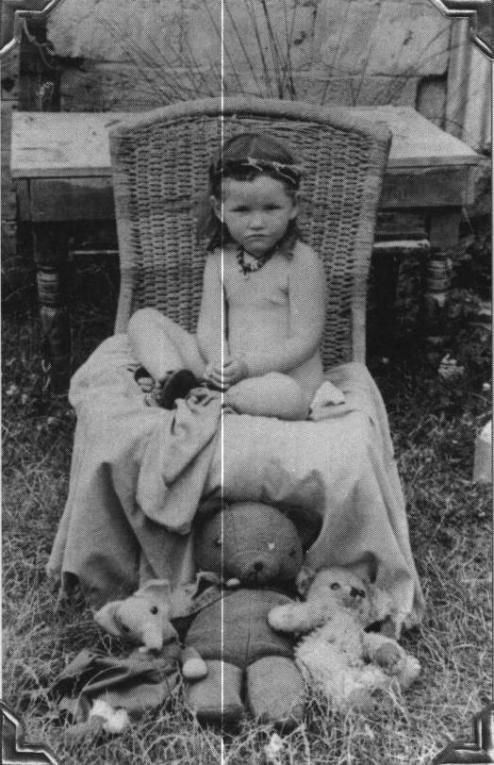"Wild Child: Girlhoods in the Counterculture" - читать интересную книгу автора (Cain Chelsea)
Paola Bilbrough
 |
That spring we lived in Canvastown there were mushrooms the size of dinner plates in the fields, frayed at the gills with lice.
My mother wore a feather in her hair, naked in profile, always painting.
My father, stringy ponytail, pink shirt, threw pots in a cow shed.
I wanted to be the neighbour’s child.
She, fat and breathless, would seat me on top of their enormous freezer, a mortuary of animal carcasses, feed me bright yellow pickle, doughy bread.
The odour of basset hounds, mutton gristle and hot vinyl.
She created nothing, sat indoors eating melted cheese from a dented frying pan.
Furrows on her husband’s brow plowed deep, skin red as raw beef.
He could listen with the trees, make a willow stick dance to the song of an underground stream.
The flick of my mother’s brush on canvas, buzz of mason bees building clay houses, the dull roar of my father’s kiln.
Across the road, the weaver at his loom, weaving a poltergeist’s footfalls into a vermilion carpet.
Sound gradually drinking in all its listeners.
The fat woman and I didn’t listen.
She was bored with the water diviner.
Resplendent in a green chenille housecoat, she turned afternoon into evening by watching
I liked to lie in her overgrown garden, watch crab apples pull malevolent faces from the tree, poke out their wormy tongues at passersby.
Appetites
Sara said her father had been a thief; she remembered other people’s fruit lighting up the bushes, oranges like planets, old sweet apples falling into her father’s flour-bag shirt. She ate nasturtiums, waxy honey. Sugar was forbidden.
Dan would gut Sunday loaves, the colour and texture of kapok. After school, mouth stained green; jelly crystals straight from the packet. Every night chocolate pudding thick and dark as estuary mud flats.
He had a milk run, drank from scratched glass bottles, cream coating his throat when he swallowed.
Sara was allowed goat’s milk, thistle milk, any milk but cow’s. That’s what separated them, she said, his complacent suburban appetites.
She thought of milk from the top of the bottle as she fingered the satin skin of his inside wrist.
Kanji
My father and I slept in a Japanese car case, kanji printed on the wall in place of family portraits.
Nights I lay awake, the black characters assumed flesh.
Clothes rustling as they changed posture.
Every morning a walk through macrocarpa to a household of stained armrests, chapatis and chipped enamel mugs.
Only chopsticks lay in our drawers, Hand-whittled and oiled.
In spring we made elderflower lemonade, white star flowers fizzing to the surface.
The elderflower a witch among trees, its character more disturbing than the kanji on our walls.
A tree whose shadow could make the mind curdle like milk.
In summer, cherry wine: each of us scrubbed calloused heels, crushed fruit in the belly of the bath, feet beating out a warlike rhythm.
A dense, sweet, almost rotten smell. Legs covered with red-black juice, the blood of summer.
Membrane 1
I was a festival child.
Cherry picking season we endured unwashed hair, scant meals.
My father was a puppeteer,
I remember sunken eyes, bruised cheeks, empty glove bodies.
In the front row of Punch and Judy
I held a stranger’s baby, its heartbeat filling the whole head.
The fontanel before the bones knit: a frog’s throat as it swallows.
Dancers knotted up baling twine hair. Rain.
And mud warm between the toes.
Seven-year-old skin gossamer between myself and the world.
In Dublin, your mother cooked Sunday roast, her stretch-suit vivid hydrangea pink.
Your father argued about the Pope over tea. All I knew of Ireland was our plow horse, Connemara.
Membrane 2
Rain, pale Irish skin, the band screaming
‘Insane in the membrane…’
You call me ‘Homegirl’ America spread over you like fake tan.
I want to take your head, smooth it off with impatient thumb.
Later, the sheet curls from a stained mattress. Your bones move apart sounding of a forest.
Trying to sleep in a fluorescent-lit garage, each of us consumed by separate pasts.
Tepee
I wore only a tight necklace, shoes the colour of a rabbit’s inside ear, buttoned over instep.
Sometimes a painted apron with flowers unfurling, spark-eyed heads in profile.
I carried my father’s offerings: pallid, hasty omelets my mother would not touch,
lemon and mint she drank in noisy gulps, painting in the midday sun.
Clay-smudged,
I sat in a manuka tepee.
Voices in my skull, boats bobbing on a river.
When my father left, we made gingerbread people, molasses-dark and crumbling, ate them slowly; an arm or leg, week by week.
I wore my shoes to bed, fell asleep to the noise of hens roosting in the pear tree.
I dreamt my mother was a statue, that I followed her to all the world’s cities, watched her in
pigeons pecking grain from her naked shoulders.
Nearby, an old violinist whose music I couldn’t hear.
| © 2025 Библиотека RealLib.org (support [a t] reallib.org) |